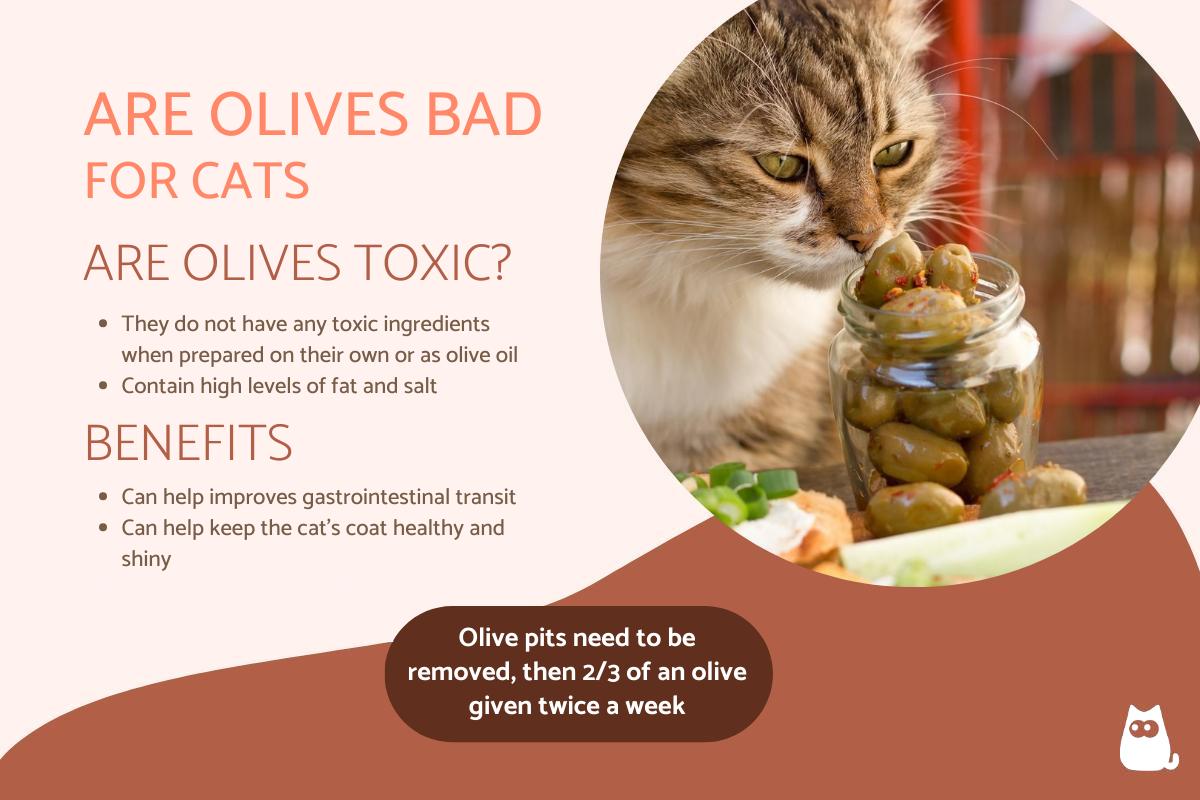Are Olives Bad for Cats? - Olives and Olive Oil Safety



See files for Cats
Whether cats can eat olives is not a concern about toxicity, but one of nutritional benefit. The safety of cats consuming olives is dependent on how it occurs. Olives are a type of fruit from the olive tree which are very bitter when raw. For this reason, they are cured and preserved to allow them to be more palatable to humans. This does not mean they are good for cats, nor does it ensure that cats will enjoy eating them. While cats can eat olives safely, it doesn't necessarily mean they should.
At AnimalWised, we learn more by asking are olives bad for cats? We look at the possible benefits of olives for cats, whether olive oil is toxic for cats and how these foods should be given to our pet.
Can cats eat olives?
To answer this question, yes cats can eat olives. Although it will depend on how they are prepared, olives do not naturally contained any toxic substances for cats. This applies to both green and black olives, as well as the different varieties of olives you can purchase. This does not mean that cats should eat olives regularly. In fact, regular consumption of olives by cats can be very harmful to the animal.
The reason for olives being bad for cats is due to their nutritional composition. Cats are obligate carnivores and need high levels of protein from animal sources. Olives are low in protein and will not provide cats with much nutritional value. Moreover, olives are usually brined in salt or preserved in oil. This means they are high in salt and fat, respectively.
Having high levels of salt and fat in a cat's diet can be very detrimental to their health. The fat can influence their weight and lead to problems with obesity. Too much salt in a cat's diet can cause serious problems to vital organs such as the kidney. Even if they do not gain weight, these problems can be potentially fatal to felines.
Short-term problems can occur with the consumption of olives by cats. Since their body is not designed to digest these foods, they can result in indigestion. Related problems such as diarrhea in cats can occur. For this reason, we should only give cats a small amount every once in a while as a treat. Regular consumption of olives is prohibited.
We also need to consider whether other ingredients are involved in the preparation of the olives. Sometimes olives are stuffed with peppers, cheese, garlic or other ingredients which might not be good for cats. Some are even marinaded in chili or other foods which might make them unappetizing or even cause upset.
Benefits of olives for cats
Although they are not high in protein, olives do contain some nutrients which can be good for cats. One example is the relatively high level of fatty acids such as oleic acid. These acids can help improve the quality of a cat's coat, making it look lustrous and shiny.
The healthy fats it contains can also help favor the intestinal transit of cats. This is also due to the fact they are high in fiber. Olive oil is particularly good for intestinal transit as it acts as a lubricant for their gastrointestinal tract. It may also help prevent the accumulation of hairballs for the same reason.
Another potential benefit of olives for cats is the promotion of joint health. This is also due to the presence of healthy fats, fatty acids and other nutrients. Vitamin A and C content may promote the health of tissues. It is also possible that some cats may find olives to help with issues of stress and anxiety, something we explain further below.

Is olive oil good for cats?
Olive oil is a product which is made from pressing fresh olives. The force of pressure causes the oil from these drupe fruits to be extracted and separated from the flesh. When extracted, there should not be any additives or preservatives, since it is a natural preservative itself.
Since there are no additional preservatives, olive oil does not contain any salt. However, it is almost pure fat. It is not toxic and a relatively healthy type of fat, but eating too much olive oil will influence obesity. It should only be consumed by cats in moderation. As mentioned above, it might provide some limited health benefits when ingested in moderation such as improving gastrointestinal transit.
Learn more about the benefits of olive oil for cats with our related guide.
Why do cats like olives?
Not all cats are the same. Some will enjoy eating olives, while others may find them particularly unappetizing. Even the smell can be similarly divisive.
One of the reasons for this is due to something in the composition of olives known as terpenoids. Also known as isoprenoids, these are natural chemical compounds which are also present in catnip. Catnip for cats is a substance which some cats will go crazy for. It can act as both a stimulant and a relaxant, although not all cats will react in the same way.
When they do respond positively, these chemicals activate the pheromone receptors of our felines in their vomeronasal organ. This can cause a rush of of energy, making them run around the room and enjoy themselves. We may see dilation of pupils and even some reckless behavior. However, not all cats respond to terpenoids in this way.
How many olives can I feed my cat?
Cats should eat olives in small quantities. Although olives are not toxic for cats when ingested, they are not an ideal food due to their nutritional composition and sodium content. The benefits we have explained are mitigated by the fact the animal cannot consume large quantities.
Generally speaking, a cat should not eat more than 3/4 of an olive twice a week. This estimation is based on a cat of average size and weight.
Although olives are not bad for cats in moderation, some foods are dangerous even when eaten in small amounts. Learn more with our article on forbidden food for cats.

How to give olives to my cat?
The correct way to offer olives to our small cats is to cut them into small pieces so that they cannot choke. It is also very important that the olive pits are removed. Olive pits can threaten the health of the cat by damaging their teeth or by being a choking hazard.
We reiterate that we should not feed olives to cats more than twice a week and only in small amounts. For this reason, olives should only be given to cats as an occasional treat. You can use them to reinforce positive behavior or to simply show love to your feline companion.
Side effects of olives for cats
It is rare for olives to cause any type of allergic reaction, but excessive or uncontrolled consumption can cause our small felines to develop problems. These are most often gastrointestinal in nature and include an upset stomach, vomiting and diarrhea.
Another important factor to consider is whether there are other ingredients in the olives. If the olive is stuffed with cheese, pepper or other ingredients, these can cause gastrointestinal upset. Chilies or spicy marinades can cause stomach upset. Garlic and onion are prohibited in cats since it contains compounds which are toxic to felines.
Contraindications of olives for cats
The main contraindications for the consumption of olives by a cat is a hypersensitivity to them or to any ingredient used in their preparation. Another important contraindication is cats with kidney disease. The high levels of salt in olives means they can exacerbate kidney disease.
Olives should also not be consumed by cats that are suffering from any gastrointestinal problem. If the cat has symptoms such as vomiting or diarrhea, it can worsen them during a brief illness. They should be avoided altogether by cats with chronic digestive diseases.
If you want to read similar articles to Are Olives Bad for Cats? - Olives and Olive Oil Safety, we recommend you visit our Homemade diets category.







